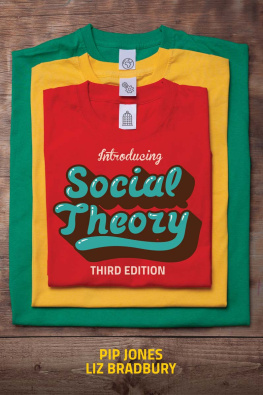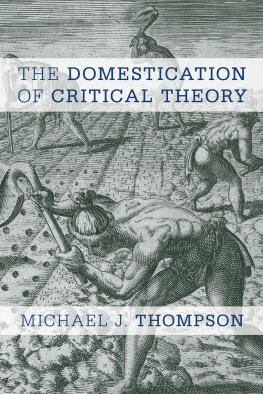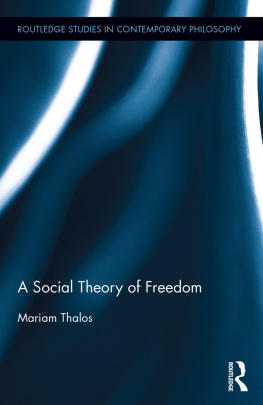ROUTLEDGE LIBRARY EDITIONS: SOCIAL THEORY
Volume 68
SOCIAL THEORY AND THE FAMILY
First published in 1975
This edition first published in 2015
by Routledge
2 Park Square, Milton Park, Abingdon, Oxon, OX14 4RN
and by Routledge
711 Third Avenue, New York, NY 10017
Routledge is an imprint of the Taylor & Francis Group, an informa business
1975 D. H. J. Morgan
All rights reserved. No part of this book may be reprinted or reproduced or utilised in any form or by any electronic, mechanical, or other means, now known or hereafter invented, including photocopying and recording, or in any information storage or retrieval system, without permission in writing from the publishers.
Trademark notice: Product or corporate names may be trademarks or registered trademarks, and are used only for identification and explanation without intent to infringe.
British Library Cataloguing in Publication Data
A catalogue record for this book is available from the British Library
ISBN: 978-0-415-72731-0 (Set)
eISBN: 978-1-315-76997-4 (Set)
ISBN: 978-1-138-78244-0 (Volume 68)
eISBN: 978-1-315-76336-1 (Volume 68)
Publishers Note
The publisher has gone to great lengths to ensure the quality of this reprint but points out that some imperfections in the original copies may be apparent.
Disclaimer
The publisher has made every effort to trace copyright holders and would welcome correspondence from those they have been unable to trace.
First published in 1975
by Routledge & Kegan Paul Ltd
Broadway House, 6874 Carter Lane,
London EC4V 5EL and
9 Park Street
Boston, Mass. 02108, U.S.A.
Set in Monotype Times New Roman
and printed in Great Britain by
Western Printing Services Ltd, Bristol
D. H. J. Morgan 1975
No part of this book may be reproduced in
any form without permission from the
publisher, except for the quotation of brief
passages in criticism
ISBN 0 7100 8179 0 (c)
ISBN 0 7100 8180 4 (p)
Contents
The first debt I must acknowledge is to my students in various classes in the Sociology of the Family, both here and in Canada. Their critical comments and their contributions to discussions first suggested the idea of this book to me and I have gained from discussion with different groups of students ever since that time. Unfortunately these students are too numerous for me to name each one individually. It is difficult, also, to acknowledge by name all the various influences that have stimulated me and shaped my thinking at or around Manchester. There are, of course, many differences and disagreements between the broad, critical perspective provided by Professor Peter Worsley and the critiques of analytical sociology provided by the newer ethnomethodologists but I have gained immensely from both emphases and both, I think, are reflected in the following pages. I have presented some of my ideas formally and informally at Manchester and have benefited from a variety of critical comments from, among many others, Ian Craib, Isabel Griffiths, Bruce Kapferer, Ken Smith and Daphne Taylorson. Those whose names I have included here should not feel that they have to take the blame for what I have written; those whose names are excluded should not feel that they have not contributed, directly or indirectly, to my thinking about sociological theory and the family.
I should also mention Professors J. Clyde Mitchell and John Rex, both of whom gave encouragement to me in the early stages of this book, and to the members of the British Sociological Associations Family and Kinship Group who, among other things, listened to and commented upon an early version of the concluding chapter. Outside Manchester I have gained particular benefit from conversations with Colin Creighton of the University of Hull and Marijean Suezle at a Summer School at the University of Alberta, Edmonton. Thanks also to Michael Shaw of Shaw-Maclean for frequent friendly encouragement and to Kay Millar and Mrs D. B. Riley for typing various sections of the manuscript.
This book is dedicated to Rosemary, Jacqueline and Julian; members of my nuclear family of procreation.
Origins of this book
Conservative and radical critics of sociology alike would probably agree with the paradoxical statement that this discipline, the study of man interacting in society, so readily becomes divorced from its human subject matter. The conservative critic may argue that sociology does not connect with man as he is, with his uniqueness, his individuality, his soul. The radical critic may argue that sociology does not relate to man as he may become, that the subject does not direct itself to raising the consciousness of the agents of social change within society. Both groups of critics may point to the increasing use of mathematical models, and to reifications brought about by theory to the distancing effect of the specialized language of structural-functionalism or ethnomethodology.
I suspect that my experience of feeling this distancing effect in the process of attempting to teach sociologyparticularly the sociology of the familymay not be a unique one. The family we discuss in lectures and tutorialsthe family with its functions, its roles, its kinship and networksoften appears to be remote from the family we experience outside the lecture room or even the family we experience through the novel, through drama and through the cinema. We know that there are often very sound reasons for this distancing. There is the need for objectivity, particularly on a subject close to everybodys experience as the family. There is the need to be able to make general statements with a wide range of applicability. Yet, many teachers are aware that unless it is possible to make some links between the subject taught and the experience of those in the teaching situation the subject will, in its deepest sense, be untrue. On the one hand there is the subject matter of the text-book and the lectures, the subject matter which is shaped and discussed and organized into examination answers or dissertations; on the other hand there is the real world of sex, marriage and the family. Very often the living dialectic between the two appears to be lacking.
This sense of a gap between what was being taught and the experience of those actually involved in the course (including myself) was made particularly acute for me while I was teaching in a Summer School class in Edmonton, Alberta. I had just read Laings Politics of the Family, the published version of his Massey Lectures for the Canadian Broadcasting Corporation in 1968, and was attempting to present some of his ideas in the class. I attempted to present a sympathetic account of these ideas in contrast to the more widely taught theories of Parsons and the broadly functionalist school as represented in most of the texts. In spite of this, at least one student maintained that I was being unsympathetic to Laing and went on to ask why it was that there had been so much concentration on Parsons. It was clear that some of the students were responding to The Politics of the Family much more readily than to Family, Socialization and Interaction Process. And the reason for this was not that Laing was easier than Parsons (both are difficult in different ways) but that Laing appeared to be talking about the family in a way which was closer to their experience and in particular that here was a discussion about families in terms stressing conflict, exploitation and contradictions.




